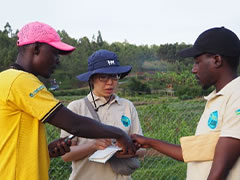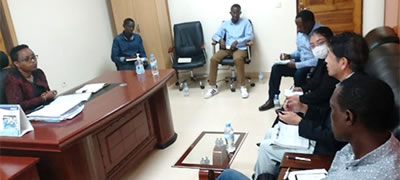- Home
- Technical Cooperation Projects
- Index of Countries
- Africa
- Rwanda
- Project for Water Management and Capacity Building
- Project News
- The extension period of the Technical Guidance Phase has begun, improvement and training activities in each District are gaining momentum for nationwide extension of the Project Outputs.
Project News
2022-06-24
The extension period of the Technical Guidance Phase has begun, improvement and training activities in each District are gaining momentum for nationwide extension of the Project Outputs.
WAMCAB was originally planned to implement with one-year as "Survey/Planning Phase", two-years as "Technical Guidance Phase" and two-years as "Institutionalization and Extension Preparation Phase". However, due to restrictions on local activities and some delays in progress by the effects of COVID-19, it was agreed to extend the "Technical Guidance Phase" for one year and the Project duration became from five years to six years. The Project is currently at the halfway point. During the extension period of the "Technical Guidance Phase" from April 2022, WAMCAB will promote face-to-face discussion and resume activities that have been delayed. In addition, in the "Institutionalization and Extension Preparation Phase" to be launched in April 2023, WAMCAB plans to support technical extension mainly by Rwandan side and the formulation of Action Plans.
The 7th Joint Coordination Committee (JCC) meeting was held on 27th May 2022, and the 13th Task Force (TF) meeting was held on 3rd June 2022. At the JCC meeting, JCC members reviewed the activities of the Project over the past six months and confirmed the implementation policies for the next three years based on the Work Plan. At the TF meeting, the Work Plan was shared in more detail and the participants discussed the preparation of documents to be finalized with TF members for sustainable capacity building.
In addition, from late May to early June, WAMCAB organized progress meetings with each District and RAB Station in each target area, and monitored the status of the model sites together with Counterpart Personnel (C/Ps). In Gisagara District, irrigation water use has begun at the night reservoir constructed by participatory approach, and the number of that facilities will be increased mainly by farmer in the future in cooperation with related organizations. In Ngoma District, the District Irrigation Steering Committee (DISC) (a forum for District-wide discussion on irrigation, with the participation of representatives from IWUO, cooperatives and Sectors) had been limited and adjourned their activities since the beginning of WAMCAB in 2019, but the meeting resumed and WAMCAB members participated in. The Project plan to continue providing support to enrich the content of the meeting agenda on a number of occasions in the future. In Rwamagana District, there are some advanced initiatives led by the District, such as the establishment of a Coordinating Committee of Rwamagana consisting of IWUOs and cooperatives in the District with a view to establishing an official IWUO federation/umbrella in the future, and site visiting with the participation of District and Sector officials. WAMCAB will continue to strengthen cooperative relationships with relevant institutions through discussions on the current situation in each area and the activity progress.
WAMCAB is also supporting for the development of the Irrigation Strategic Plan by MINAGRI through management of local consultant. Currently, WAMCAB is conducting surveys on irrigation service fees and the status of nationwide DISCs, which serve as basic information for its development. By incorporating the irrigation management model, mechanism and supporting system of Irrigation Management Transfer proposed by WAMCAB, it is expected that the Project Output will extend throughout Rwanda.
 Site visiting
Site visiting
 Meeting with target District
Meeting with target District
(WAMCAB OJT Haruka MISHIMA)
- About JICA
- News & Features
- Countries & Regions
- Our Work
- Thematic Issues
- Types of Assistance
- Partnerships with Other Development Partners
- Climate Change / Environmental and Social Considerations
- Evaluations
- Compliance and Anti-corruption
- Science and Technology Cooperation on Global Issues
- Research
- JICA Development Studies Program / JICA Chair
- Support for the Acceptance of Foreign HRs / Multicultural and Inclusive Community
- Publications
- Investor Relations
